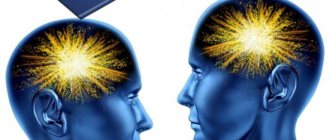This article was developed under the heading: Psychology.
Section: Character.
A misanthrope is a person who despises most people for their inherent weaknesses and vices. This is a person who opposes himself to society, stands on the sidelines, wants to be surrounded by people who clearly stand out in society for their unusual behavior and outlook on life. He is a misanthrope. Is there such a person in your life? Don't know how to interact with him? Let's figure out together who misanthropes are and what are the reasons for such behavior.
Let's look at where misanthropy came from
Who is a misanthrope and what is misanthropy?
A misanthrope is an unsociable person, he avoids society and despises most people for voluntarily giving up their individuality. Having a tough attitude towards the weaknesses, mistakes, vices and stupidity of people, he carefully sorts out those with whom he is ready to build social interaction. He still perceives his narrow circle of friends with positivity and respect, and condescendingly forgives them for minor shortcomings.
The manifestation of misanthropy in everyday life is characterized as a cynical and disrespectful attitude towards specific social groups and towards humanity in general. The misanthrope is indifferent to the political correctness of his statements. The misanthrope's misanthropy, as a rule, consists of contempt, but does not imply hatred and the desire to hurt someone.
The misanthrope has no inclination to help someone because he believes that people are supposed to take care of themselves. They are often contrasted with a philanthropist - someone who treats everyone kindly and happily provides help to everyone who needs it.
There is a belief that a misanthrope is a cold and callous person who is unknown to human feelings. In fact, he, like any other person, feels the need for friendship and romantic relationships, strives to create a strong family, and have success in his personal life. But his demands on people are too high; he chooses his friends carefully.
Misanthropy is often contrasted with the concept of “altruism.” In fact, this is a true statement, since misanthropes do not consider it their duty to help anyone. Moreover, they believe that a person should achieve everything on his own so as not to lose his personal individuality. However, a more correct position would be to contrast the misanthrope with the humanist.
How did the term come about?
The term "misanthrope" has ancient Greek origins. It is derived from the Greek words “misos” (hatred) and “anthropos” (man), so it literally translates as “misanthropy.” This concept originated from philosophers and scientists who tended to be in constant isolation from society and its misunderstanding.
Ancient philosophers defined the misanthrope from different angles. Thus, Heraclitus said that it is unbearable for a misanthrope to be in the company of people, since the latter do not share the views of the misanthrope. Socrates said in his works that one becomes a misanthrope after a long series of deception by people. Plato noted that the misanthrope is between good and evil.
The popularization of the term occurred after its use in popular culture began. For example, P. Bruegel painted the painting “The Misanthrope”.
P. Bruegel. "Misanthrope". 1568
Is misanthropy a disease or the norm?
The most common opinion is that misanthropy is not a disease that has symptoms, but is a character trait formed as a result of the influence of certain life situations. In fact, there is ongoing debate on this issue. Since alienation from society can only be a consequence of another disease, but also the cause of psychological trauma. What makes misanthropy one of the psychological problems of humanity.
Is misanthropy a disease?
Svetlana Kovalenko
Psychologist, clinical psychologist
Ask a Question
Any psychological illness is quite difficult to identify based on character traits. The same applies to misanthropy. Most often, signs of unsociability and misanthropy are treated as a side symptom of other diseases. However, we now live in a more complex world. Therefore, misanthropy can be classified as a social human disease, which is quite difficult to diagnose. This is due to the fact that currently there is no unified method for treating and diagnosing such a disease.
Introvert and extrovert
I would like to note right away that, despite the opposite character traits, the “introvert-extrovert” union can quite successfully exist. True, for this the parties will have to learn to compromise.
For example, it is not difficult to guess that introverted individuals find the life model of extroverts inappropriate and impractical. However, most likely, such a practical person will try out some of the habits of his other half, thereby trying to please her, and at the same time learn something new about himself.
The situation is much more complicated with the “introvert-introvert” couple. If the parties in a short time cannot find common interests, as well as reasons for spending time together, they can become two “strangers” living at the same address, each of whom is exclusively occupied with their own self-development.
How to best communicate with an introvert
The best way to communicate is to follow these 7 rules::
- Show tact in everything and respect the introvert’s personal space . For example, you should not enter his room without getting permission or knocking on the door.
- Don’t expect to live with your significant other in a “together 24/7” mode . By depriving our hero of communication with himself for a long time, you can only achieve negative emotions and resentment.
- Be sure to plan all joint activities in advance , warning the introvert a week, or even a month before their implementation.
- Don't force him to be happy and look cheerful . Otherwise, he will go deeper into himself!
- Develop personally and realize yourself ! Introverted individuals feel comfortable being around good-natured, intelligent and purposeful people.
- Support him in awkward moments , especially when meeting/communicating with strangers.
- Don't expect emotions to show in society . Such a person can truly open up only in private with someone whom he completely trusts.
Hatred in misanthropy
The hatred of all humanity that the misanthrope experiences is expressed in the desire to separate from people, minimize contacts and avoid close ties. At the heart of this worldview is contempt for human imperfections.
Hatred towards oneself and towards humanity as a whole is often called a manifestation of marginality. Professor M. Pauen defines misanthropes as flickers, loners who do not feel they belong to society, but at the same time use society to isolate themselves from it.
Hatred of people
Expressing hatred and disgust towards humanity, usually a misanthrope who does not like people maintains good relations with specific people. The motive for misanthropy is the need for isolation from society or contempt for traits characteristic of most people.
In this matter, it is important to dwell on the positions of philosophers who spoke about the causes of misanthropy in misanthropy:
- Plato. He said that hatred of people is a psychological problem. That is, Plato assumed that a person becomes a misanthrope due to deep traumas that influenced the formation of a person’s personality;
- Cicero. In contrast to the previous position, it was stated that misanthropy is a mental disorder and illness. In his opinion, unbalanced and unhealthy individuals come to misanthropy.
In general, each position has its place. Misanthropy can be caused by various factors, from childhood trauma to psychological disorders.
Misanthrope's self-hatred
Misanthropy often presupposes hatred of oneself, as a direct representative of humanity. Such human feelings can be called the extreme degree of manifestation of misanthropy as behavior and life. In this case, detachment and discussion from society is justified by the devaluation of oneself as an individual, as well as the meaninglessness of building social connections.
Misanthropy is accompanied by feelings of hatred towards oneself and towards society
Introductory information
An introvert is a quiet, measured, calm person who is completely immersed in his inner world. however, this does not mean at all that he is alien to violent feelings, dreams, ideas and thoughts.
The thing is that introverted people keep it all in “their head and heart,” hiding it from prying eyes and, because of this, periodically falling out of reality, which often becomes the cause of resentment to their interlocutors, who may feel that their words are falling on deaf ears. , not considered important.
Although, physically, the introverted listener is nearby - with his thoughts he is somewhere out there, outside the physical world, as evidenced by his complete indifference to what is happening, his absent look. At the same time, psychologists argue that the process of distraction by one’s thoughts manifests itself unconsciously.
That is, such behavior is not disrespect or ignorance of the world around us, but rather a hidden need to “discuss” certain things with oneself.
Types of misanthropes
According to general characteristics, there are two main types of misanthropes:
- passive - these are individuals who do not show obvious aggression;
- active - those who do not hide the manifestation of negativity towards others and even experience pleasure from insults and humiliation of people they do not like.
However, delving into the characteristics of a misanthrope, we can also identify such types as a “bitter personality” and a “fighter for justice.”
Fierce Personality
This type only notices the bad side of the world, believing that humanity cannot change, so it is necessary to completely refuse communication. They can turn into recluses and hermits.
Fighter for justice
This type is an idealist who loves the world deep down and dreams of improving it. Being a supporter of any reforms, he does not tolerate injustice well, as a result of which he acquires a sharply categorical attitude towards individuals, but not towards the whole world.
Misanthropes cannot be reduced to a general model of behavior; they can be completely different personalities
How to recognize a misanthrope
A misanthrope differs from other people by characteristic features. These include:
- Individualism. Having placed your “ego” on a high pedestal, you need to remember the need to adhere to certain limits of what is permitted, so as not to become a modern Pechorin or Childe Harold. The misanthrope does not remember this.
Philosophers considered manifestations of misanthropy as a manifestation of extreme individualism, the opposition of the individual to society. This behavior can become a kind of philosophical guideline and meaning of life.
- Protest against society. You shouldn’t blindly follow the norms imposed by society, because being a puppet is not the best way to express yourself. But the misanthrope so clearly experiences negative feelings and contempt for his surroundings that it cannot be ignored.
- Nihilism. The misanthrope is skeptical about the norms accepted in society, sarcastically ridiculing them. This also applies to religious movements.
- Pessimism. The misanthrope is bored communicating with people, and he does not hide it. Moreover, he... more depressed in understanding life and events.
- Enjoying your own characteristics. The misanthrope does not consider himself a flawed person, he loves himself and enjoys hating people.
It is important to understand that the enjoyment of one's own individuality does not extend to cases where the misanthrope also experiences hatred for himself. In this case, there can be no talk of pleasure.
- Unsociability and caution in choosing acquaintances. Misanthropes do not surround themselves with friends and relatives because they like to be alone with themselves.
- There is no detection of extreme aggression. Misanthropes are not aggressive, but they despise people.
How is a misanthrope different from a sociopath?
Misanthropy cannot be equated with sociopathy. The latter is a serious type of mental disorder, while misanthropy for the most part is a specific form of worldview. A misanthrope is a person who does not like people.
Sociopaths lack the ability to empathize and sympathize with people. They are capable of doing bad things without thinking that they are doing harm to anyone. When making decisions, they take into account only their own desires, ignoring the interests of others. The misanthrope, on the contrary, behaves conscientiously and responsibly, taking into account the interests of others and acting fairly towards them.
The only thing in which misanthropes are similar to sociopaths is their belief in their exclusivity. They perceive people as a faceless gray mass, but do not see themselves as flawless and perceive their shortcomings critically.
Svetlana Kovalenko
Psychologist, clinical psychologist
Ask a Question
We have already told you earlier that the perception of misanthropy only as a certain type of behavior and worldview is not correct. Misanthropy can be a consequence of a person's weed. For example, a person was often offended, humiliated, betrayed. As a result, he has a psychological problem that does not allow him to feel healthy and happy. Hence, misanthropy is a way of closing oneself from the negative experience of the past in order to prevent it from being repeated in the present. Therefore, I believe that a misanthrope is also a person with psychological trauma or disorder.
How does a misanthrope differ from an introvert?
The misanthrope hates people, and the introvert only feels uncomfortable in society, but does not consider it necessary to waste energy on negativity.
An introvert and his behavior is associated with being more comfortable alone than in society. But this does not mean that the introvert avoids people. He can maintain strong social connections, communicate in a team, etc. An introvert is only behavioral characteristics, that is, modesty, reluctance to attract undue attention to oneself, shyness in a new social group, etc.
The misanthrope is not distinguished by a quiet and modest disposition. On the contrary, his views are aggressive and defiant. His recluse manifests itself in hatred of others without exception.
A misanthrope, a social phobe and an introvert are completely different personalities that cannot be identified with each other
Characteristics of an Introvert
The list of main traits characteristic of introverts includes:
- Strong attachment to their chosen interests/hobbies , as well as loyalty in relationships;
- increased patience , as well as restraint and observation;
- the urgent need for verified results (planning) and the search for the deep meaning in everything that happens;
- avoiding large crowds of people (queues, parties, companies, etc.);
- high need for independence , as well as inviolability of personal space;
- isolation and constant desire for loneliness.
It is worth noting that the last of the points described above are especially important! After all, the desire for solitude does not mean that introverts do not like communication. Rather, they prefer dosed communication to constant communication.
Quite often, as an illustration, experts compare this feature with a draining phone battery :
- 100% charge - after a night's rest;
- 90% charge remains when you arrive at work;
- no more than 72% of the charge remains by lunchtime, after communicating with colleagues;
- 65% (sometimes less) – at the beginning of afternoon work;
- 40% — remains at the end of the working day, if there were no work meetings, meetings with the boss, etc. (if there is a corporate event, you don’t have to continue counting, because after it, in any case, no more than 5% will remain);
- a trip home from work and buying the necessary goods/products, however, like meeting/conversing with a neighbor, will take more 20%.
Each incoming phone call throughout the day from a stranger (a waste of energy to compensate for awkwardness and uncertainty) is also guaranteed to take away from 5 to 10% of the “charge” .
To recharge his internal battery, an introvert needs to plunge into a kind of meditative state or engage in a favorite activity/hobby. In addition, complete restoration of strength can be ensured by lying in silence or taking a short nap .
At first glance, it may seem that an introvert is trying to avoid meeting people, because 90% of them give him nothing but a feeling of emptiness and dissatisfaction. But is this really so? No
Although, every introverted person strives to avoid meaningless conversations (especially with strangers), but at the same time strives for communication in which he reveals his own new facets.
Again, as an example, we can cite the consumption of high-quality expensive drinks :
- First, a small sip is taken and the person stretches out every drop - this is the beginning of an interesting conversation for an introvert.
- The stage of fascination with the interlocutor and lively communication can be compared to large sips. At this stage, the person feels euphoria and dizziness.
- The next stage, as a rule, is the peak of intoxication and a feeling of complete relaxation, that is, complete dissolution in the essence of the conversation.
- Well, after this comes nausea and loss of control over the body - the stage of satiety both with the conversation and with the interlocutor.
- Naturally, this all ends with a hangover and the need to restore strength/energy, which in turn leads to attempts to avoid similar situations in the future.
The thing is that, like extroverts, introverts are in dire need of such “hops,” but, unlike the former, most of our today’s heroes of the article learned in childhood/adolescence to leave before passing the “point of no return.”[/colonizator_col ]
No, these people are not social phobes or misanthropes , because they avoid consequences, but not causes. Solitude and silence are the door to a world of harmony and peace. Into their own world.
Signs of misanthropy
A misanthrope is recognized by the following characteristics:
- Avoidance of society.
- Distrust and contempt for people.
- Arrogance.
- Careful selection of friends.
- Desire to stay away from others.
However, in order to more accurately understand how to distinguish a misanthrope from other people, let's take a closer look at some of the signs of misanthropy.
Human vices irritate me
Hatred for people fills the heart of a misanthrope. He negatively perceives those around him, as if they have no virtues, and only have vices that irritate him catastrophically. Moreover, a misanthrope can be irritated by those qualities of a person that are present in him. For him this does not play a significant role.
The main characteristic of a misanthrope is irritation with almost all features of human behavior.
Dislike for people's weaknesses
A pronounced dislike for the weaknesses of others leads the misanthrope to gradual alienation from society and loneliness. The misanthrope imagines himself to be a strong and strong-willed person, as well as distinguished by a special individuality. Therefore, he can treat the manifestation of weaknesses by people with a special degree of cynicism.
Limiting communication
Limitation in communication leads a person to a gradual loss of social connections, when selfish needs become paramount. The misanthrope sees no purpose in communicating with the “gray masses.” He considers himself better than others.
Need for protected space
The need for a protected space arises due to a person’s inability to create meaningful relationships. A misanthrope isolates himself from everything that can cause mental pain and disappointment.
The listed signs will help you identify a misanthrope in yourself and in your environment.
Causes of misanthropy
The main causes of misanthropy are:
- psychological trauma received in childhood can contribute to a loss of faith in humanity;
- poor upbringing, when parents were unable to give the child information about the nuances of interaction with people and life in society;
- developed intelligence, allowing you to instantly see narrow-minded people.
Let's look at each reason in more detail.
Hard childhood
When a child is severely punished for misdeeds, he may become disciplined, but will begin to think that a person cannot be imperfect. Having matured and discovered the imperfection of the world, he will begin to feel contempt for people, perceiving them as stupid and irresponsible.
Our traumas come from childhood
Svetlana Kovalenko
Psychologist, clinical psychologist
Ask a Question
Surely, you have heard more than once that all our adult problems come from childhood. And indeed it is. The way we were treated, what we felt and heard as children leaves an imprint on the formation of our entire personality. Often, if a child was suppressed by his parents in childhood and his opinion was not taken into account, then he ends up in the same relationship in adulthood. He transfers his family model to his life. This is how a person becomes a victim in a relationship, ends up in an abusive relationship, etc.
The same applies to misanthropy. Bullying, humiliation, misunderstanding are the reasons for hatred towards people. That is why a person may feel the desire to isolate himself from the whole world.
High intelligence
Intellectuals who, having high intelligence, understand that there are few smart people in the world often become misanthropes. Geniuses often show disturbances in the construction of social life. In fact, they know too much and think on too high topics to perceive this world simply.
Miseducation
Wanting to make the child ideal, parents instill in him decency and responsibility, but do not explain that people are different. Becoming a maximalist, a young man expects people to conform to his ideas, but is convinced of the opposite and becomes a misanthrope.
This reason can also be considered as a factor of “difficult childhood”. The values that our parents instill in us are subsequently the foundations of our lives. Correcting them is quite difficult - only through long-term therapy and awareness of one’s own personality.
Betrayal of loved ones
Often a person who has experienced betrayal, especially repeated betrayal, becomes a misanthrope. Over time, he comes to the conviction that he can only trust himself.
Betrayal and deception become the causes of conscious and acquired misanthropy
Disappointment in people
Disappointment sometimes causes depression and, as a result, can form misanthropic views. Especially when a person is constantly disappointed in people. Such factors cannot but negatively affect the formation of personality.
Dissatisfaction with your life
Dissatisfaction with one's own life can be a good reason for a person to withdraw into himself and stop paying attention to the behavior of other people. Deeply disappointed, a person may stop reacting to what is happening in the outside world.
In this case, there is a rather fine line between misanthropy, depression and their combination. Therefore, it is necessary to diagnose with a specialist what caused this behavior in a person.
Soul emptiness
Mental emptiness narrows perception: a person withdraws from the world and stops communicating with people. When other people address him, he begins to become irritated, the incentive to act disappears, and his social communication skills become dull. Here we are talking specifically about depression, as well as chronic depression. Such conditions definitely need treatment.
Important: if you observe a loss of strength, a lack of desire to do something, a meaningless existence and cannot get out of this state on your own, contact a psychotherapist. He will diagnose the causes of this condition, and in extreme cases, prescribe medications to help you get out of depression.
Special sensitivity of character
There are sensitive, so-called “thin-skinned” natures, with strong impressionability and instability. All the time faced with the imperfections of society, they prefer to distance themselves from it and not allow strangers to approach them. Hateful contact with society only leads to irritation.
Mental illness
Scientists have found that misanthropes have a high risk of developing dementia. In addition, there is a relationship between certain types of mental illness and misanthropy, although it cannot be said that the latter is the cause of these disorders. For the most part, it is their consequence or symptom. Thus, misanthropy can have a negative impact on health.
The causes of misanthropic behavior are multifaceted - from trauma and upbringing to psychological disorders.
Introvert as a child
About studying
Usually, our today's heroes hide behind the appearance of “gray mice” who are excellent at studying both exact and humanitarian subjects.
Either the child becomes a child prodigy, distributing his attention evenly between various areas, or he tries to deepen his knowledge in a certain subject that interests him (here it all depends on his upbringing and character traits).
An introverted child may be first in class in physics and chemistry, but lag behind in languages and literature. Or, the young genius will delve into the study of history and begin to take first place in Olympiads, but he will not touch chemistry and biology at all.
A striking feature that distinguishes such children is their increased nervousness during collective problem solving and the desire to solve them independently.
About friendship
Typically, such children do not have more than 2-3 friends, and their school friendships last for decades after graduation.
In this case, most often, the role of friends is played by peers who somehow interested the little introvert and those who themselves took the initiative in trying to make friends with this eccentric.
About the dangers
Considering all of the above, a child may become a victim of bullying and ridicule from others. His apparent peacefulness, quiet nature, and constant praise from teachers and adults turn the other children against him.
Often, to all this is added the fact that some teachers join in the “bullying”, condemning and not understanding the natural isolation of an introverted child.
In this case, family psychologists recommend that parents explain to teachers that their child is fine, but in order to unlock his potential, teachers will need to apply an individual approach to him.
How to communicate with a misanthrope?
We have already found out that misanthropes are quite difficult people to understand and communicate with. Therefore, we can recommend the following tips for communicating with a misanthrope:
- avoid heated discussions and disputes;
- try not to touch upon topics of a social and moral nature;
- If you see that the person is not in the mood to communicate, reschedule the conversation;
- gain the misanthrope’s trust in order to establish contact with him;
- You shouldn’t be negative, otherwise you risk causing the misanthrope’s aggression.
To communicate with a misanthrope, you need to understand him and not be excessively negative
Afterword
As you can see, an introvert (as well as his opposite - an extrovert) is an absolutely normal person who is endowed with his own shortcomings and advantages, and a closed personality is not a psychological disorder!
The secret to optimal communication with introverts is simple. All it takes is a little respect for their personal space and basic human understanding. In return, you will receive next to you a faithful and wise companion who will never disappoint and will always come to the rescue in difficult times.
TAKE THE TEST
Next
PsychologyWho is an extrovert - characteristics and psychological portrait
How do people feel about misanthropes?
People are different, and accordingly, they can relate to misanthropes very differently. This is a wide range of emotions: from categorical rejection to desperate pity. However, misanthropes are no different from us. They are ordinary people, with their own special understanding of this world and people. Therefore, you should not be overly aggressive towards misanthropes. You cannot know what event caused this behavior. This means you cannot judge a person for right or wrong behavior.
Introvert and relationships
Now, let's look at the main 7 qualities of an introvert in a relationship :
- They do not try to impose their thoughts and habits on their soulmate.
- Loyal, devoted and prone to self-sacrifice.
- They take any action extremely scrupulously and seriously, but, nevertheless, they are distinguished by weak initiative.
- They are always ready to prove their feelings in practice, but rarely express them in words.
- Constantly strive for intimacy.
- They prefer not quantity, but quality.
- Always ready to listen to your loved one, trying to put yourself in his position.
These extraordinary personalities, as a rule, try to preserve even relationships doomed to break to the last. At the same time, after breaking up, they rarely try to restore their former connection.
I'm a misanthrope - what should I do?
In this case, there is no reason to worry. And that's why:
- Firstly, misanthropes are characterized by an increased level of intelligence. And this is nice.
- Secondly, misanthropy can be corrected over time, and the most convinced misanthropes are able to fall in love with society.
However, if you are worried about factors such as dislike of people, irritation, or a constant feeling of loneliness, you can begin to “treat” this problem. And also eradicate signs of misanthropy in yourself.
Is it good to be a misanthrope?
This question does not have a clear answer. Misanthropy manifests itself differently in different people, so the results of these manifestations can be unexpected. So, there are misanthropes who do charity work. Some people see this as a way to increase self-esteem, while others selfishly shape their image.
The degree of expression of misanthropy in society also varies. Some are able to remain peacefully alone, while others, on the contrary, show their misanthropy aggressively, and therefore are capable of causing harm to themselves and others.
Misanthropy cannot be unequivocally assessed in terms of “good” or “bad”
Treatment of misanthropy
You can remove a negative attitude towards the world through actions characteristic of philanthropists. Misanthropes are advised:
- take steps towards people;
- do charity work;
- provide assistance to those who need it;
- participate in the arrangement of the area near the house, playground, park area;
- organize interesting leisure activities for young people;
- attract people with talents to creative, scientific or innovation work.
The misanthrope will begin to communicate with people and realize that it is pleasant to do useful things. Having felt that he himself is capable of improving any situation, he will change his attitude towards the world and become more tolerant.
If all else fails, seek help from a specialist. The psychotherapist will find the cause of your problem. He will give recommendations on how to heal a wounded soul. Misanthropy is not the cause of mental disorders, but it can accompany certain psychiatric diseases and influence their course. Therefore, you may need the help of a psychiatrist who will prescribe effective treatment.
The most effective treatment option is to consult a psychologist
How to get rid of misanthropy?
When you don't try to correct the situation, the problem will go beyond reasonable limits. Inappropriate reactions may occur, which are provoked by a lack of ability to meet people halfway. You need to know how to remove negative manifestations. There is not and cannot be universal advice in this situation, because therapy presupposes a readiness to change and make informed decisions. Hatred is a destructive force for a person, and you need to get rid of it, even if you don’t like it.
Recognizing the problem
The first step to start with is recognizing the problem. By denying the need to follow the voice of reason, you cannot achieve any good results. Showing cynicism does not help you gain respect from others. However, sometimes people stop trying to solve their problems. They may become fixated on false views and think that nothing can be improved. When thinking about how to overcome limiting circumstances, it is unacceptable to give in to hatred by letting it into your heart.
Try to maintain communication and trust in the people around you. Even if family relationships leave much to be desired, you should not completely give up trying to improve them.
The need for compromise
Misanthropes often wonder how to overcome hatred of a person. This is a positive sign that leads to change. A person should understand that he cannot do without other people. In any case, you will need to communicate with someone and make informed decisions. Without understanding how to correct such a condition, it is impossible to move forward and understand your mistakes. It is necessary to learn to find compromises where necessary.
You need to realize that no one likes truth-tellers. By thinking critically about everything, you can lose the social circle to which you are accustomed, becoming a non-contact person. Such a situation will damage mental health, open old wounds, and prevent the opportunity to reach a qualitatively new level of development.
Interest groups
Not understanding how to overcome hatred of a person, many do stupid things. To stop focusing on your failures and stop expecting the worst from people, it’s good to find communication with similar interests. A highly intelligent person will be uninteresting among ordinary people. You will need to find people you are interested in in order to recharge yourself with good impressions.
Positive emotions can work wonders; they make it possible to pay attention to good life events. By uniting in interest groups, you can forget about your problem and realize how to get rid of hatred towards a person. Such events are held in libraries and cultural centers.
Communicate more with people you are interested in to overcome hatred towards society
Participation in charity
Filling yourself with positive feelings will help you get rid of misanthropy. Learn to give warmth just like that, without the need for return and preliminary predictions of the result. Become a volunteer, organize help for those who are in trouble or for animals without a home. Such actions will help you feel the multifaceted nature of life and understand the value of communicating with people. This way you will stop perceiving others as something hostile.
In the fight against misanthropy, act “from the opposite side” - show altruism and love towards people
What is the difference between a misanthrope and a sociopath?
If you look at the meaning of the word misanthrope, you will see a difference from a sociopath. The latter has clinical ailments. Illness and misanthropy are a state of mind. Sociopaths are completely indifferent to the feelings of others. The ability to use violent actions against those you don’t like, without experiencing remorse or feelings of pity or shame. A sociopath tends to blame everyone and make excuses for his behavior.
For a sociopath to become aggressive, it is enough to expose him to some irritant: sound, bright light, aggravation of the situation. The misanthrope simply has a negative attitude towards a person’s weaknesses and does not want to get involved with these people. At the same time, he can be compassionate, understanding, and follow social norms. Sociopaths are not secretive. They want to hurt people, they are violent. At the same time, they are not at all shy about their attacks.
There are also similarities between these personalities, otherwise no one would compare them. A misanthrope and a sociopath consider themselves smarter and better than the gray masses. They understand their superiority in intelligence, so they do not want to have anything to do with others. In addition, misanthropes react poorly to their own mistakes, as well as to strangers. They can explain what is going on and can work on their shortcomings. As for sociopaths, they believe in their own perfection without admitting that they may be wrong.
Famous misanthropes
Among the famous people susceptible to misanthropy were many philosophers and thinkers.
Schopenhauer hated the world, yet his work is still in demand, even though it has passed through the centuries. Jean Jacques Rousseau had a bad character, but gave the world many of his works. Nietzsche treated fundamental cultural and moral concepts with contempt and mercilessly criticized religion, but the whole world reads him. Unsociability and the desire to limit contact with people led Przhevalsky to study animals, and Tchaikovsky to write many talented works. The publicity of the acting profession did not in any way affect the misanthropy of Bill Murray.
However, history also contains examples that reflect the destructive side of misanthropy. Adolf Hitler openly hated certain human qualities, so he wanted to purify humanity and create a better race. The methods by which Stalin acted are also far from philanthropy.
Philosopher Arthur Schopenhauer - one of the most famous misanthropes in history
Books about misanthropes
There is a lot of literature that talks about misanthropy, the nuances of the life of misanthropes. Here are some of these books:
- I. Edelfeldt, “Contemplating Dogs.” The hero of the novel is characterized by unsociability. He chooses to communicate not with people, but with dogs. The novel is a letter written by the hero for his psychiatrist.
- G. Hesse, “Steppenwolf”. The novel explores the psychology of a person in search of himself. He is critical of society, but is torn between the human and animal principles.
- D. Gorchev, “The Wild Life of Gondwana.” The book contains misanthropic stories, absurd situations and black humor.
In Russian classics you can also find images of misanthropic heroes. Thus, Bazarov from Turgenev’s work “Fathers and Sons” was defined by the author as a nihilist. However, in his behavior one can see signs of a misanthrope.
Films about misanthropes
There are various films and TV series that show a person who hates people. Here are some of them:
- "How to marry a bachelor." A story about two lonely people who hated each other from the very first meeting. However, they also experience hostility towards other people.
- "Sherlock." Sherlock Holmes is considered one of the most famous literary misanthropes. He experiences hostility towards people, despite the fact that he wants to help them.
- "Dr. House". The popular series is about a doctor who does not hold back his negativity when communicating with people.
- "Fight club". The story is about two lonely characters who are members of a club in which the participants fight to get rid of accumulated negative emotions.
Introvert and career/work
Enclosed spaces (such as a noisy office) are every introvert's nightmare! Therefore, most people of this type choose the following professional fields:
- Man-technology . Driver, electrician, engineer, car mechanic and other similar professions.
- Man-nature . Botanist, agronomist, veterinarian, farmer, zoologist.
- Man-sign (numbers and letters). Translator, programmer, writer, accountant.
The most attentive people have probably already found the common denominator of all these professions. Yes, each of them implies detachment from people and independent work.
What type of work are you more inclined to?
Man-technologyMan-natureMan-sign
In addition, quite often, introverts go into professions that are closely related to art. Naturally, if such work does not require frequent communication/meetings. So, for example, they can easily become artists, but never actors or dancers.









